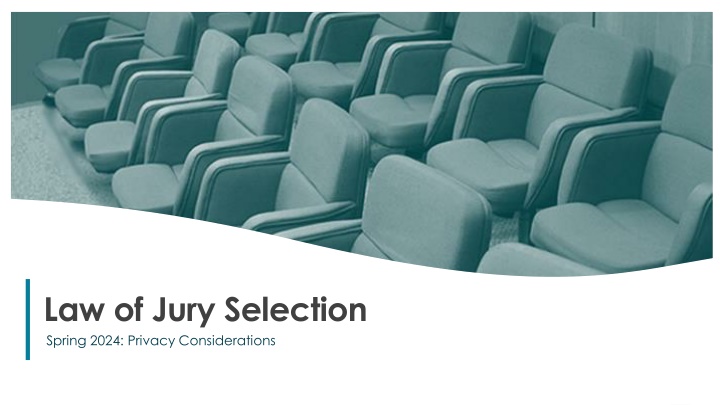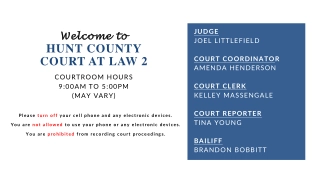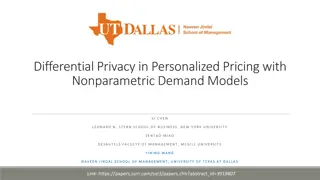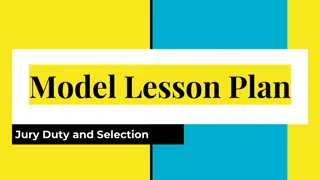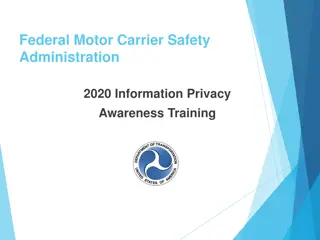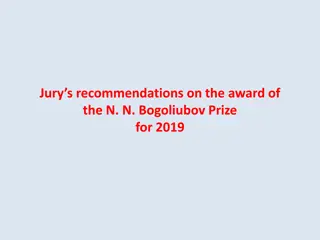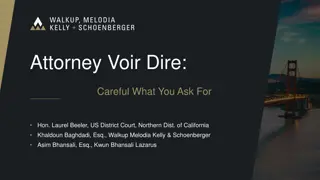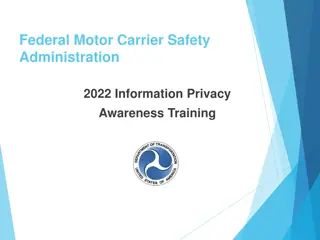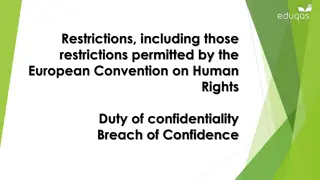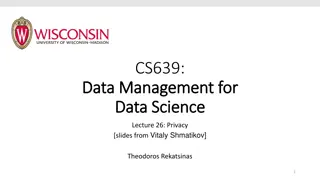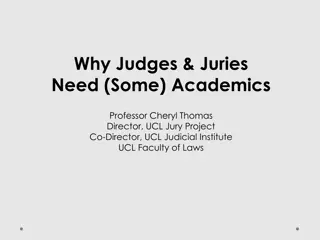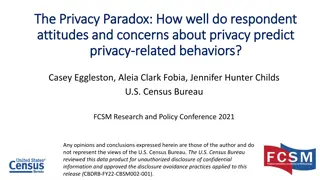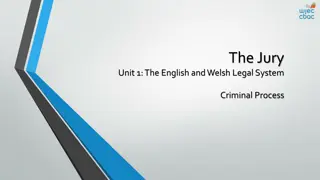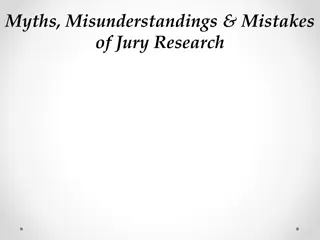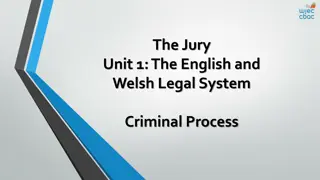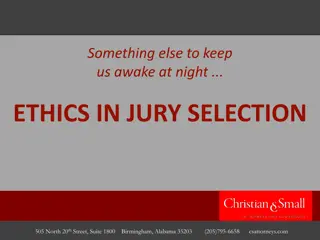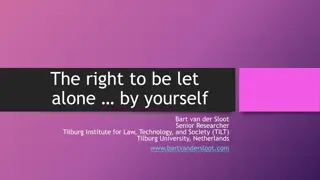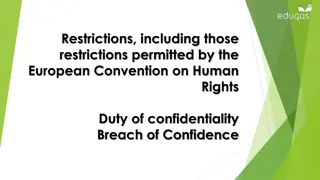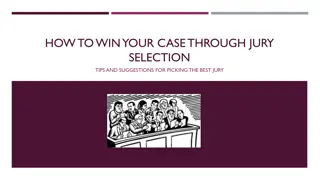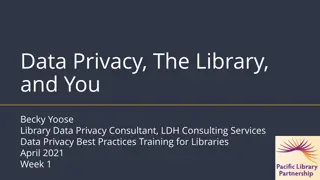Privacy Considerations in the Law of Jury Selection
Exploring the importance of privacy considerations in jury selection, this content delves into the rights of jurors in relation to the public, parties, and each other. It highlights legal cases and quotes emphasizing the protection of jurors' constitutional privacy rights. The content covers topics such as the role of attorneys, HIPAA regulations, background checks, and the intersection of religion and politics in voir dire. Various solutions available to trial courts to ensure privacy are also discussed.
Download Presentation

Please find below an Image/Link to download the presentation.
The content on the website is provided AS IS for your information and personal use only. It may not be sold, licensed, or shared on other websites without obtaining consent from the author.If you encounter any issues during the download, it is possible that the publisher has removed the file from their server.
You are allowed to download the files provided on this website for personal or commercial use, subject to the condition that they are used lawfully. All files are the property of their respective owners.
The content on the website is provided AS IS for your information and personal use only. It may not be sold, licensed, or shared on other websites without obtaining consent from the author.
E N D
Presentation Transcript
Law of Jury Selection Spring 2024: Privacy Considerations 1
Privacy Considerations As between jurors and the public, jurors and the parties, and jurors and each other 2
[W]hile the parties have attorneys to champion their rights, the court must protect the constitutional privacy rights of the prospective juror.... nothing about becoming a prospective juror amounts to a willing waiver of an expectation of privacy. -People v. James, 304 Ill.App.3d 52 (2d Dist. 1999) 3 3
HIPAA: Just because one gets called into jury service does not give eager and assiduous counsel the right to rummage through one s medicine cabinet, perusing the array of Rx labels. -United States v. McDade, 929 F. Supp. 815, 817 (1996) 5 5
BACKGROUND CHECKS: [There will be no] public record search, computer background checks or criminal background checks of any juror in this case I've not heard the case made in this case why criminal background checks should be run. - United States v. Sorich, 427 F. Supp. 2d 820 (N.D. Ill. 2006) 6 6
RELIGION & POLITICS: [Voir dire] is not designed to subject prospective jurors to a catechism of their tenets of faith, whether it be Catholic, Jewish, Protestant, or Mohammedan, or to force them to publicly declare themselves to be atheists. - United States v. Barnes, 604 F.2d 121, 141 (2d Cir. 1979) 7 7
[U]nbridled voir dire into venire members' religion, politics, social standing, family ties, friends, habits of life and thought, would strip jurors of any semblance of privacy. -Weinstein, Protecting a Juror's Right to Privacy: Constitutional Constraints and Policy Options, 70 Temp. L. Rev. 1, 16 (1997). 8 8
Solutions Available to the Trial Court Supplemental Questionnaires Side Bars Individualized Voir Dire 9
[T]he First Amendment guarantees of speech and press, standing alone, prohibit government from summarily closing courtroom doors which had long been open to the public at the time the Amendment was adopted. -Richmond Newspapers, Inc. v. Virginia, 448 U.S. 555, 576 (1980) 11 11
[H]ow we allocate the 'right' to openness as between the accused and the public, or whether we view it as a component inherent in the system benefitting both, is not crucial. No right ranks higher than the right of the accused to a fair trial. But the primacy of the accused's right is difficult to separate from the right of everyone in the community to attend the voir dire which promotes fairness . -Press-Enterprise Co. v. Superior Court of California, 464 U.S. 501 (1984) 12 12
[W]e note that prospective jurors are likely to have preconceptions about the defendants in almost every criminal case that attracts media attention. If this fact alone were sufficient to warrant closure, then courts could routinely deny the media access to those cases of most interest to the public, and the exception to openness would swallow the rule.... - ABC, Inc. v. Martha Stewart, 360 F.3d 90, 101 02 (2d Cir. 2004). 13 13
ANONYMOUS JURIES (MODERN): Anonymous juries are permissible when the jurors' safety would be jeopardized by public knowledge, or the defendant has attempted to bribe or intimidate witnesses or jurors.... When considering this subject, the district judge should take account of the Supreme Court's observation in Presley v. Georgia, 130 S.Ct. 721, 724 (2010), that, before closing any part of the criminal process to the public , a judge not only must make ...findings ...but also must consider alternatives to secrecy, whether or not the lawyers propose some. -United States v. Blagojevich, 2010 WL 2778838, at *6 (7th Cir. 2010). 14 14
SEQUESTRATION: [The jurors were exposed to information] of a character which the trial court ruled was so prejudicial that it could not be directly offered as evidence. The prejudice to the defendant is almost certain to be as great when that evidence reaches the jury through news accounts as to when it is part of the prosecutors evidence. It may indeed be greater for it is then not tempered by protective procedure. -Marshall v. United States, 360 U.S. 310 (1959). 15 15
ANONYMOUS JURIES (HISTORIC): [T]he district court noted the government's evidence linking Vario to the Lucchese crime family, and stated that the recent experience of jury tampering in the case of United States v. Gotti, an unrelated organized crime trial, was a factor warranting an anonymous jury . To be sure, the specter of organized crime has played into our previous decisions to uphold the use of anonymous juries, but in these decisions, it was the reasonable likelihood of juror intimidation, not the incantation of the words the mob or organized crime, that prompted the anonymous jury. -United States v. Vario, 943 F.2d 236, 240-241 (2nd Cir. 1991). 17 17
Law of Jury Selection Spring 2024: Privacy Considerations 18
